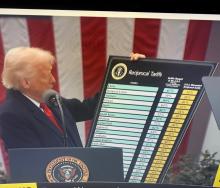The Department of Home Affairs has opposed The Helen Suzman Foundation’s (HSF) Pretoria High Court bid challenging its decision to terminate the Zimbabwean Exemption Permit (ZEP).
The HSF said in a statement announcing that it was heading to court to challenge Home Affair’s Minister Aaron Motsoaledi’s decision to end the permits, that the special dispensation regime had offered legal protection to approximately 178 000 Zimbabweans, allowing them to live, work and study in South Africa.
“It has prevailed for well over a decade, meaning that permit-holders have built lives, families and careers here and contributed to South Africa and its economy. But in a process that allowed for little notification and no public consultation, the minister announced in November 2021 that the ZEP would be terminated,” the HSF said.
At present, ZEP holders must have obtained other forms of residency authorisation - in the majority of cases, an almost impossible requirement - by December 31 or leave the country.
“They will be put to a desperate choice: to remain in South Africa as undocumented migrants with all the vulnerability that attaches to such status, or return to a Zimbabwe that, to all intents and purposes, is unchanged from the country they fled. There are thousands of children who have been born in South Africa to ZEP holders during this time who have never even visited their parents’ country of origin,” the foundation said.
It added that it was not advocating that illegal migrants remained in South Africa or that the ZEP continued in perpetuity, but that the decision be declared unlawful, unconstitutional and invalid and that it be reviewed and reconsidered with meaningful public engagement.
“Those who have scrupulously observed South Africa’s laws…to live and work here under the ZEP cannot have such permits terminated without fair process, good reason, and a meaningful opportunity to regularise their status,” the HSF said.
In his affidavit opposing the application, Department of Home Affairs Director General, Livhuwani Tommy Makhode said the minister’s decision had been hasty but the department had given ZEP holders 12 months to regularise their status. He added that the permit was always intended to be temporary.
“It was intended, initially, to give a large number of undocumented Zimbabweans, about 1.5 million in 2009, the opportunity to regularise their stay in South Africa. The uptake figures were small and, over the years, the numbers have steadily declined,” he said.
“The relief the HSF seeks will effectively confer rights of permanent residence on ZEP holders, in the face of express conditions on which the permits were issued. It seems to contend that because the permits were renewed from time to time, this confers on them a substantive legitimate expectation that they should be renewed in perpetuity, and that they be entitled to remain in the country until the economic situation in Zimbabwe improves to the extent that the HSF and the court find acceptable,” he said.













